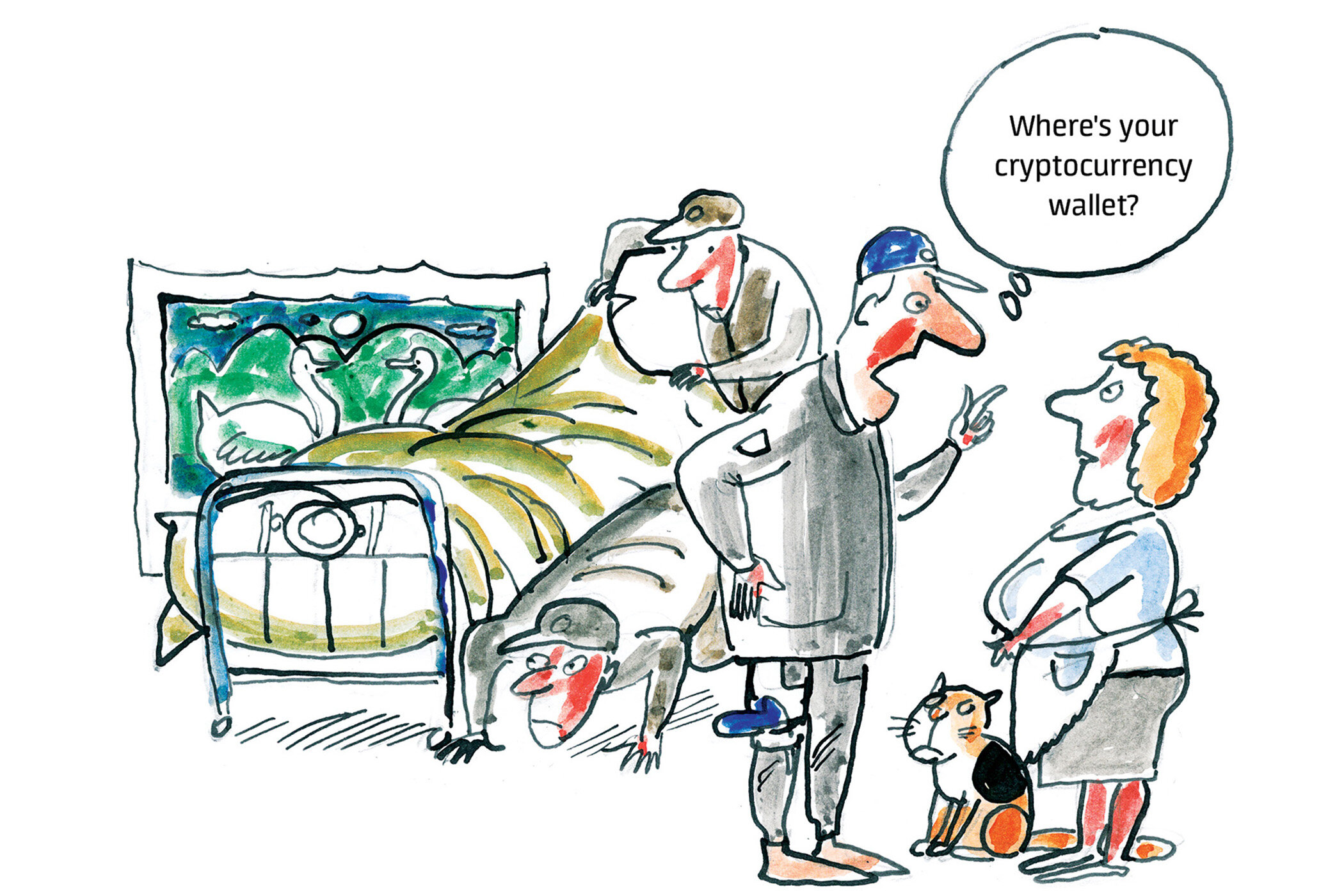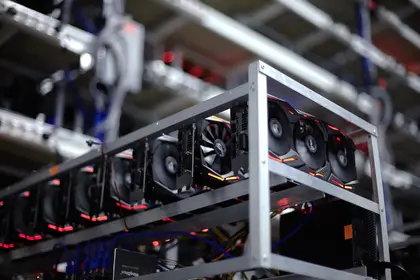Michael Chobanian, one of the leaders in Ukraine’s crypto industry, was on his way to a meeting when law enforcement officials tackled him.
Chobanian was shocked as law enforcement raided his apartment on that November day six years ago, hunting for a mining farm and an e-wallet with cryptocurrency.
JOIN US ON TELEGRAM
Follow our coverage of the war on the @Kyivpost_official.
The Department Combating Cybercrime of the Interior Ministry seized all of his devices, as well as SIM cards and promotional materials advertising bitcoin.
- View the freshest war in ukraine update in the Kyiv Post’s daily news pieces that came out today.
- Access the latest Ukraine news coverage for today.
However, Chobanian didn’t do anything illegal. He was simply a victim of the yet unregulated crypto industry in Ukraine.
Ukraine’s rising cryptocurrency market is missing the legal framework it needs to realize its potential. Multiple laws currently being discussed in Ukraine’s parliament would not only prevent further attacks against crypto entrepreneurs, but would de-shadow the crypto market and encourage foreign investment in Ukraine’s growing crypto market.

Illegal raids
Chobanian is a pioneer of the crypto domain in Ukraine.
In 2014, he founded KUNA, the first bitcoin agency in Ukraine and Eastern Europe. In 2015 he went on to launch an exchange for crypto assets, Kuna.io.
The exchange was a big factor in the raid. In allowing Ukrainians to trade the cryptocurrency Bitcoin, officials claim Kuna was not in accordance with the National Bank. But in 2014, the NBU had referred to cryptocurrency as a money substitute.
Later, in 2017, the NBU ditched its 2014 references to cryptocurrency.
Its joint statement with the National Securities and Stock Market Commision, and National Commission for Regulation in the Sphere of Financial Services Markets read that cryptocurrency can be identified “neither as cash or currency and legal tender of another country, nor as currency value, electronic money, securities, or a monetary surrogate”.
Chobanian’s court case ended up with his victory on Nov. 16, 2015. The court ordered law enforcement officials to give Chobanian back his equipment.
His case wasn’t unique. The Security Service of Ukraine, or SBU, raided the home of Russian-born Anatoly Kaplan (Klimov), founder of a magazine about bitcoin, blockchain technology and the digital economy Forklog, on Dec. 15, 2017.
The SBU seized his equipment, accusing Kaplan of money laundering and transferring cryptocurrencies to Russia, as well as occupied Donbas and Crimea.
Initially the SBU stated that the raid was connected to an investigation against the U.S. and Ukrainian citizens who stole money from payment cards. Investigators claimed the suspects allegedly exchanged bitcoins for hryvnia using Forklog, but the service doesn’t even offer the ability to do so.
Artem Afian, Kaplan’s attorney and managing partner at the law firm Juscutum, said that his client was innocent.
Many crypto entrepreneurs and experts see eye to eye that most raids against miners and traders of cryptocurrencies don’t have any legal justification.
“It was probably an attempt to make money by law enforcement officers,” Deputy Minister of Digital Transformation for IT Development Olexandr Bornyakov told the Kyiv Post.
According to him, officers mostly raid mining farms. “It’s unregulated now, but that doesn’t mean it’s illegal,” said Bornyakov.
Gray mining
Although the crypto industry in Ukraine is unregulated and Ukrainians cannot register as crypto entrepreneurs and cryptocurrency exchanges, it is completely legal to mine and trade cryptocurrencies.
It is even possible to pay taxes from the profit generated from the mining or the sale of the cryptocurrency. Afian says that crypto entrepreneurs must pay 18% of personal income tax and a 1.5% military fee.
Cryptocurrency exchanges operate in the country legally, but Ukrainian platforms are usually registered in other countries. Chobanian says that the most common jurisdictions are Estonia, U.K., Malta, Singapore and Dubai.
For sure, international crypto exchange platforms also work in Ukraine but face some restrictions.
Gleb Kostarev, director of Binance in Eastern Europe, says that Ukrainian banks cannot work with crypto projects at the moment. Ukrainian users can’t directly pour fiat money — government-issued currency not backed by a commodity — into an exchange via bank payment. They can only do so using a payment card.
The absence of regulation puts the launch of the Binance card and office in Ukraine on hold.
Impossible to regulate
To protect crypto users, exchange platforms and develop the crypto market in Ukraine, the government has to adopt more than one law.
Officials have already taken one step, passing a law on the prevention of profit laundering and financing terorrism in 2019. However, its points on virtual assets can’t be implemented now because the core law on virtual assets hasn’t been passed yet.
It is the first law in Ukraine that defines virtual assets, including tokens, cryptocurrencies and others.
According to it, exchanges, banks and other companies that make payments in cryptocurrency must check transactions more than Hr 30,000 (about $1,000) and request detailed information about their clients.
If the transaction looks suspicious, it must be sent to the State Financial Monitoring Service, which can investigate and block crypto wallets and seize money.
The next step in developing the market is passing a set of laws on virtual assets. Lawmakers have already voted for the first core bill in the first reading and are preparing it for the second reading.
The law defines the legal status of the virtual assets, basic rules and demands for providers of services with virtual assets.
“We don’t regulate Bitcoin, Ethereum, Tether, tokens. The subject of regulation is service providers,” said Bornyakov.
It is impossible to regulate cryptocurrency because its system is decentralized.
Bornyakov says that it’s better to regulate the crypto sphere than to ban it. “Bans will lead to nothing,” said Bornyakov.
However, Afian says that “the law is not the end of the work”.
Further down the line, lawmakers must pass some bylaws about how service providers should register and create penalties for violations.
The Ministry of Digital Transformation plans to make amendments to the Tax Code, as well, setting the income tax rate at 5%, at least for several years, after which it can be slightly increased. Lawmakers are still working on this bill.
Bornyakov believes that the low tax rate may encourage foreign crypto investors to enter the Ukrainian market.
“It’s our goal to build one of the best jurisdictions for crypto companies around the world,” said Bornyakov.
Afian agrees. He believes that the combination of normal transparent rules, a friendly regulator and a sufficiently comfortable and developed banking system can make Ukraine one of the world’s hubs for crypto business.
However, Chobanian is concerned that if the parliament passes only the core law on virtual assets and leaves out the passage of other related laws, including tax amendments, it may lead to negative consequences.
He thinks the 19.5% tax rate is too high. If the lawmakers only pass the core law without the amendments to the tax code, people won’t pay it and “it will give free rein to law enforcement officials” to impose fines and continue raiding property of crypto entrepreneurs. ·
You can also highlight the text and press Ctrl + Enter




